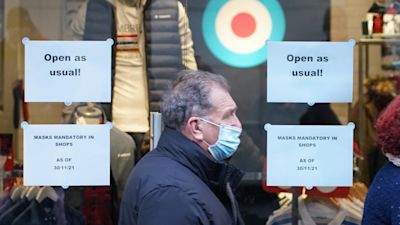Masks become mandatory in most indoor settings in England

New mask-wearing rules have come into force today in a bid to slow the spread of Covid, amid rising infections.
Masks must be worn in more settings including cinemas, theatres and churches, as measures are tightened in England. The legal requirement to wear masks has also been extended to more indoor spaces including museums, galleries and community centres.
But masks do not need to be worn in hospitality settings such as pubs and restaurants, or in gyms or nightclubs.
Listen to the inside story of the ITV News Downing Street party exclusive
Tougher restrictions have been branded a "necessary evil" by a scientist advising the government, who said the new approach "absolutely is not an overreaction".
Sports stadiums are also included in regulations published on Thursday evening, but the Department of Health confirmed face coverings will only be mandatory in indoor areas. Meanwhile, The Daily Telegraph cites an anonymous government source as saying it is "very likely" visitors in social care settings will be limited to only three designated visitors as part of plans being considered by ministers.
There were a total of 817 confirmed cases of the Omicron variant in the UK as of Thursday, the UK Health Security Agency said. It comes as Public Health Scotland urged people to cancel their Christmas parties, in a message which clashes with Boris Johnson’s suggestion that festive bashes in England should still go ahead despite a call for workers to stay away from offices. Dr Nick Phin, the organisation’s director of public health science, said party-goers should delay their festive gatherings until another time to help in the effort to slow virus spread.
Professor John Edmunds, a member of the Scientific Advisory Group for Emergencies (Sage), said cases of the variant will keep rising. On restrictions, he told a Royal Society of Medicine briefing: "I think it’s a necessary evil … it’s very damaging for parts of the economy, the hospitality sector, retail sector in particular -they’re going to be affected. "Unfortunately, we have to do it. The rate at which this virus is spreading is doubling every two or three days." He added: "Even though there’s very few cases here now, and it seems like an overreaction, it absolutely is not an overreaction."
Health Secretary Sajid Javid has warned the number of UK Omicron infections could hit one million by the end of the month. He has insisted the new measures are necessary to "build our collective defences" through the vaccination programme in the face of the rapidly-spreading variant. Ministers have faced criticism for introducing tougher measures, with anger in the Conservative party fuelled by suspicions the new restrictions were introduced as an attempt to distract from the Prime Minister’s troubles over an alleged staff party in Downing Street during last December’s lockdown.
Friday’s measures come ahead of a return to working from home on Monday and mandatory Covid passports for large venues from Wednesday, as the Government’s Plan B comes into force. The new regulations will be put to a debate and vote in the Commons next week – and with Labour’s support they are certain to be approved, despite the prospect of a large Conservative revolt. Despite officials appearing to say that under new rules shoppers could be allowed to remove their face coverings in supermarkets if they walked around the store singing, regulations state that someone may take a mask off if it is "reasonably necessary" to sing. The regulations state that such occasions "include singing as part of a choir, or during a service or rehearsal, or for performance". Downing Street has said it would be "hard to justify" people having a "reasonable excuse" to remove their masks to sing while getting groceries under the new rules.
The Plan B measures will be reviewed on January 5, before their expiry date of January 26.